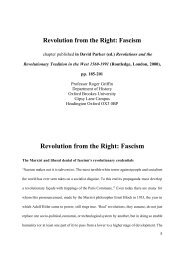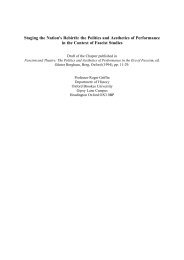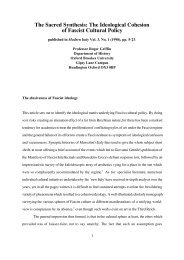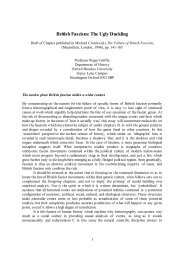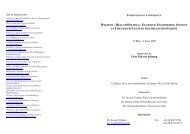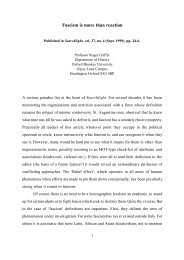The palingenetic core of generic fascist ideology - School of Arts and ...
The palingenetic core of generic fascist ideology - School of Arts and ...
The palingenetic core of generic fascist ideology - School of Arts and ...
Create successful ePaper yourself
Turn your PDF publications into a flip-book with our unique Google optimized e-Paper software.
<strong>The</strong> <strong>palingenetic</strong> <strong>core</strong> <strong>of</strong> <strong>generic</strong> <strong>fascist</strong> <strong>ideology</strong><br />
Chapter published in Aless<strong>and</strong>ro Campi (ed.), Che cos'è il fascismo? Interpretazioni<br />
e prospettive di ricerche, Ideazione editrice, Roma, 2003, pp. 97-122.<br />
Pr<strong>of</strong>essor Roger Griffin<br />
Department <strong>of</strong> History<br />
Oxford Brookes University<br />
Gipsy Lane Campus<br />
Headington Oxford OX3 0BP<br />
It is a curious paradox that, even if Mussolini’s regime itself was far from pursuing<br />
a consistent policy <strong>of</strong> autarky in the sphere <strong>of</strong> cultural production, Italy’s post-war<br />
academic industry has generally displayed an intransigently protectionist attitude to<br />
foreign models <strong>of</strong> <strong>generic</strong> fascism. 1 This has certainly spared the country being<br />
flooded with inferior intellectual products. At the same time it has kept out some<br />
advanced heuristic tools which in the right h<strong>and</strong>s might have led to long overdue<br />
revisions in the conventional ways Italians, both inside <strong>and</strong> outside the intelligentsia,<br />
conceptualize the place which the ‘ventennio <strong>fascist</strong>a’ occupies in national <strong>and</strong><br />
European history. 2 A sign <strong>of</strong> the ‘fuso orario’ that has opened up between the<br />
domestic <strong>and</strong> foreign market <strong>of</strong> ideas in this sector is that the very term ‘<strong>generic</strong><br />
fascism’, so central in the Anglophone social sciences to distinguishing between<br />
(Italian) Fascism <strong>and</strong> ‘fascism’ as an ideological genus existing on a par with<br />
‘socialism’ or ‘liberalism’, still grates on the Italian ear, <strong>and</strong> has to be translated into<br />
such gauche paraphrases as ‘il fascismo inteso come genere’ or ‘il fascismo concepito<br />
in senso generale’. 3<br />
It was only after I had cut my political science teeth on (Italian) Fascism <strong>and</strong><br />
then become through marriage part <strong>of</strong> an extended Italian (Genovese) family, that I<br />
embarked on an odyssey through numerous modern political cultures in the quest for<br />
the legendary ‘<strong>fascist</strong> minimum’. Thus to be asked to provide an outline <strong>of</strong> my<br />
theory directed specifically to an Italian readership <strong>and</strong> pr<strong>of</strong>essionally translated<br />
into Italian is a sort <strong>of</strong> home-coming. I would ask the reader to assess mine no<br />
differently from the chapters contributed by more recognized historians <strong>and</strong> social<br />
1
scientists in this volume: 4 in the best tradition <strong>of</strong> wine-tasting it should at least be<br />
given time to leave a bouquet in the mouth before being spat out. To pursue the<br />
analogy further, my own contribution might be compared to an Australian wine from<br />
a recently established vineyard, rather than a vintage di origine controllata. It will<br />
hopefully prepare those unfamiliar with my work for its distinctive flavour if I place<br />
it within the context <strong>of</strong> a significant development which I believe has taken place in<br />
the last decade within the convoluted debate concerning the existence <strong>and</strong> nature <strong>of</strong><br />
‘<strong>generic</strong> fascism’, a topic over which enormous quantities <strong>of</strong> printer’s ink <strong>and</strong><br />
cartridge toner have been consumed since 1945.<br />
When I entered the debate as an ingénu some ten years ago articles <strong>and</strong><br />
essays on <strong>generic</strong> fascism regularly opened with a ritual lament about the chronic lack<br />
<strong>of</strong> consensus on even the most basic definitional issues raised by the concept. Every<br />
attempt made by a non-Marxist scholar since the 1920s to <strong>of</strong>fer a way out <strong>of</strong> the<br />
conceptual labyrinth posed by fascism seemed only to have enlarged <strong>and</strong><br />
complicated it further, with the result that historians attempting to study aspects <strong>of</strong><br />
the <strong>generic</strong> phenomenon ‘idiographically’ were generally at a loss as to which<br />
‘expert’ to turn for a working definition (most chose wisely to avoid the subject<br />
altogether). In the course <strong>of</strong> the 1990s the situation changed beyond recognition.<br />
Certainly books repackaging conventional Marxist orthodoxies 5 or perpetuating the<br />
traditional confusion 6 are still published sporadically, <strong>and</strong> every so <strong>of</strong>ten the debate<br />
is enlivened by the appearance <strong>of</strong> a monograph <strong>of</strong>fering a maverick approach. 7 But<br />
there has been an unmistakable tendency for recent contributions both to<br />
conceptualizing fascism, <strong>and</strong>, just as important, to underst<strong>and</strong>ing concrete aspects<br />
<strong>of</strong> its historical manifestation, to converge on a cluster <strong>of</strong> axioms. It would appear<br />
that, at least for the present fascism is, as the academic Newspeak would have it,<br />
becoming a less ‘contested’ concept. 8<br />
<strong>The</strong> broad area <strong>of</strong> scholarly consensus 9 which now exists, admittedly one<br />
with highly fuzzy boundaries, is that: fascism is best approached as a genuinely<br />
revolutionary, trans-class form <strong>of</strong> anti-liberal, <strong>and</strong> in the last analysis, anti-<br />
conservative nationalism. As such it is an <strong>ideology</strong> deeply bound up with<br />
modernization <strong>and</strong> modernity, one which has assumed a considerable variety <strong>of</strong><br />
external forms to adapt itself to the particular historical <strong>and</strong> national context in which<br />
2
it appears, <strong>and</strong> has drawn on a wide range <strong>of</strong> cultural <strong>and</strong> intellectual currents, both<br />
left <strong>and</strong> right, anti-modern <strong>and</strong> pro-modern, to articulate itself as a body <strong>of</strong> ideas,<br />
slogans, <strong>and</strong> doctrine. In the inter-war period it manifested itself primarily in the form<br />
<strong>of</strong> an elite-led ‘armed party’ which attempted, mostly unsuccessfully, to generate a<br />
populist mass movement through a liturgical style <strong>of</strong> politics <strong>and</strong> a programme <strong>of</strong><br />
radical policies which promised to overcome the threat posed by international<br />
socialism, to end the degeneration affecting the nation under liberalism, <strong>and</strong> to bring<br />
about a radical renewal <strong>of</strong> its social, political <strong>and</strong> cultural life as part <strong>of</strong> what was<br />
widely imagined to be the new era being inaugurated in Western civilization. <strong>The</strong> <strong>core</strong><br />
mobilizing myth <strong>of</strong> fascism which conditions its <strong>ideology</strong>, propag<strong>and</strong>a, style <strong>of</strong><br />
politics, <strong>and</strong> actions is the vision <strong>of</strong> the nation’s imminent rebirth from decadence.<br />
It was ultimately the change <strong>of</strong> ethos <strong>and</strong> paradigm that has made it part <strong>of</strong><br />
‘common sense’ to take <strong>fascist</strong> <strong>ideology</strong> seriously as a genuinely revolutionary form<br />
<strong>of</strong> nationalism which gave the fruits <strong>of</strong> my own research a sufficiently appetizing<br />
flavour for them not to be discarded as swiftly as some other interpretations. 10 If my<br />
approach has acquired an ephemeral importance at a formative stage in the current<br />
evolution <strong>of</strong> the debate, it has lain in two areas. Firstly, in drawing attention to the<br />
centrality to fascism’s ideological dynamics <strong>of</strong> the myth <strong>of</strong> national rebirth (<strong>and</strong> in<br />
doing so presenting a considered theoretical case for treating this myth as the elusive<br />
‘<strong>fascist</strong> minimum’). Secondly, in demonstrating the heuristic value <strong>of</strong> the definition<br />
<strong>of</strong> fascism which results by supplying a stream (or rather a steady drip) <strong>of</strong><br />
publications where it forms an integral part <strong>of</strong> the conceptual framework used to<br />
investigate empirically a wide range <strong>of</strong> issues relating to <strong>generic</strong> fascism. Some <strong>of</strong><br />
these are extremely broad ‘ the <strong>ideology</strong> <strong>of</strong> fascism, 11 the history <strong>of</strong> the debate over<br />
fascism’s definition, 12 the relationship between fascism <strong>and</strong> the theatre 13 or<br />
religion, 14 ‘fascism’ as an entry in an encyclopaedia 15 ‘ others highly specific: the<br />
underlying cohesion <strong>of</strong> Fascist 16 <strong>and</strong> Nazi 17 art policies, the temporal revolution<br />
induced by Nazi ritual politics, 18 the <strong>fascist</strong> <strong>ideology</strong> <strong>of</strong> a French groupuscule, 19 the<br />
debt <strong>of</strong> the programme <strong>of</strong> the Alleanza Nazionale 20 or the Nouvelle Droite 21 to<br />
‘historic fascism’.<br />
A full exposition <strong>of</strong> the theoretical basis for all such undertakings is to be<br />
found in my first book, <strong>The</strong> Nature <strong>of</strong> Fascism, 22 which at the time <strong>of</strong> its publication<br />
3
(1991) seemed yet another ‘maverick’ attempt to resolve what was still universally<br />
regarded as the intractable ‘<strong>fascist</strong> conundrum’. It is somewhat ironic, then, if the<br />
subsequent emergence <strong>of</strong> the new paradigm can now make that book appear part <strong>of</strong><br />
an orthodoxy, or even ‘groundbreaking’, rather than what it was easy to dismiss as<br />
at the time: an over-ambitious, over-condensed, highly idiosyncratic, jejune attempt<br />
to resolve the whole <strong>of</strong> the <strong>fascist</strong> debate in one fell swoop: ‘Everything you ever<br />
wanted to know about fascism <strong>and</strong> never dared to ask’. But though <strong>The</strong> Nature <strong>of</strong><br />
Fascism had many <strong>of</strong> the characteristic faults <strong>of</strong> books based on doctorates, it also<br />
had some features which I hope will st<strong>and</strong> the test <strong>of</strong> time (which in the postmodern<br />
age means a few years at most!).<br />
First, no matter how heavy-going it is to read, chapter one was original in<br />
<strong>of</strong>fering an analysis, heavily indebted to Max Weber’s methodological precepts, <strong>of</strong><br />
why the debate over the definition <strong>of</strong> fascism had been so convoluted, focusing<br />
attention on the ideal-typical nature <strong>of</strong> all <strong>generic</strong> concepts in the social sciences. It<br />
argued that as a <strong>generic</strong> concept ‘fascism’ could have no empirical essence to serve<br />
as the basis <strong>of</strong> an objective definition: the ‘<strong>fascist</strong> minimum’ had to be invented ‘ not<br />
discovered ‘ through a process <strong>of</strong> ‘idealizing abstraction’. <strong>The</strong> dialogue <strong>of</strong> the deaf<br />
into which much <strong>of</strong> the debate over fascism had degenerated in the past was<br />
attributable to the naive methodological realism which led most participants to treat<br />
their own theory as ‘true’, rather than as a heuristic device to be judged solely in<br />
terms <strong>of</strong> its usefulness as a tool for empirical research. I still consider the recognition<br />
<strong>of</strong> the essentially ‘imagined’ <strong>and</strong> experimental nature <strong>of</strong> any definition <strong>of</strong> fascism a<br />
vital premise to the spirit <strong>of</strong> openness which must prevail in <strong>fascist</strong> studies for them<br />
to progress without the dogmatism <strong>and</strong> small-mindedness which have <strong>of</strong>ten been<br />
displayed in the past. <strong>The</strong> Tarzan/Godzilla-like enmity which occasionally breaks<br />
out over the definition <strong>of</strong> fascism between academics with vulnerable male egos is<br />
particularly unfortunate given the topic they are working on.<br />
Second, the ideal type <strong>of</strong>fered in <strong>The</strong> Nature <strong>of</strong> Fascism seems<br />
retrospectively to have captured the spirit <strong>of</strong> the embryonic new consensus both<br />
with its Spartan, ‘autarchic’ simplicity, <strong>and</strong> with the central emphasis it put on<br />
rebirth. After decades <strong>of</strong> theories <strong>of</strong> fascism which at best <strong>of</strong>fered elaborate check-<br />
lists <strong>of</strong> its main features, <strong>and</strong> at worst took the form <strong>of</strong> discursive descriptions, not<br />
4
to say impressionistic ramblings, which denied it any discernible definitional<br />
contours, here the whole phenomenon was synthesized into a single sentence:<br />
Fascism is a political <strong>ideology</strong> whose mythic <strong>core</strong> in its various permutations is a<br />
<strong>palingenetic</strong> form <strong>of</strong> populist ultra-nationalism.<br />
As the subsequent ‘unpacking’ <strong>of</strong> the sentence made clear, the claim made in this<br />
ideal type was that the ideological driving force <strong>of</strong> fascism which informs all its<br />
empirical manifestations (organization, style, policies, behaviour, ethics, aesthetics<br />
etc.) <strong>and</strong> determines its relationship with existing political, social <strong>and</strong> cultural<br />
realities, including rival ideologies, is the vision <strong>of</strong> the nation being capable <strong>of</strong><br />
imminent phoenix-like rebirth from the prevailing crisis <strong>and</strong> decadence in a<br />
revolutionary new political <strong>and</strong> cultural order embracing all the ‘true’ members <strong>of</strong> the<br />
national community. In my more manic, Nietzschean moments I considered this<br />
single sentence the social scientific equivalent <strong>of</strong> a formula in mathematics or<br />
physics. Its pr<strong>of</strong>ound implications for underst<strong>and</strong>ing fascism would be made<br />
increasingly transparent by my book to the point where the definition acted in the<br />
head <strong>of</strong> the reader like a scimitar slashing through the tangled Gordian knot <strong>of</strong><br />
controversy which down through the years had formed round the concept fascism.<br />
Though ‘<strong>palingenetic</strong> ultranationalism’ has only rarely had such an epiphanic<br />
effect on actual readers, it was gratifying to find that when Eatwell <strong>and</strong> Payne<br />
subsequently published their own monographs on fascism they also provided a<br />
succinct, one sentence definition. In fact, unless academic testosterone is distorting<br />
my judgement, I believe any new theory <strong>of</strong> fascism should meet the challenge <strong>of</strong><br />
being summarizable in a sentence if it is not to be a work <strong>of</strong> obfuscation rather than<br />
clarification. (<strong>The</strong> most recent <strong>of</strong>ferings from Laqueur, Renton, <strong>and</strong> Gregor all failed<br />
this test, <strong>and</strong> it will be interesting to see how well forthcoming contributions due to<br />
be made to the debate by Robert Paxton, Robert Soucy, <strong>and</strong> David Baker fare in this<br />
respect.)<br />
Like any ideal type, my definition results from the act <strong>of</strong> simplifying <strong>and</strong><br />
ordering in the charmed realm <strong>of</strong> utopian thought phenomena which are irreducibly<br />
complex <strong>and</strong> messy in their natural habitat <strong>of</strong> external reality. This has led at least<br />
5
one eminent academic (who should have known better) to accuse me <strong>of</strong> an<br />
‘essentialist’ approach to fascism. However, as is explicitly stated in the book, a<br />
corollary <strong>of</strong> the ideal-typical nature <strong>of</strong> any definition <strong>of</strong> fascism is the realization that<br />
there is no mysterious essence waiting to be discovered which will constitute the<br />
‘<strong>fascist</strong> minimum’. Some other scholars have had a similar reaction to the highly<br />
schematic theoretical sections <strong>of</strong> <strong>The</strong> Nature <strong>of</strong> Fascism when they criticize it for<br />
losing contact with the concrete historical realities <strong>of</strong> fascism. This is an unfortunate<br />
impression to have created, since the concept ‘<strong>palingenetic</strong> ultra-nationalism’ was<br />
originally ‘abstracted’ from an extensive body <strong>of</strong> raw material, namely hundreds <strong>of</strong><br />
primary source texts relating to the <strong>ideology</strong>, propag<strong>and</strong>a, <strong>and</strong> policies <strong>of</strong> Fascism,<br />
Nazism, <strong>and</strong> a wide selection <strong>of</strong> abortive inter-war <strong>and</strong> post-war ‘putative <strong>fascist</strong>’<br />
movements. <strong>The</strong> prevalence <strong>of</strong> the rebirth myth being projected onto the nation, <strong>of</strong><br />
an obsession with degeneration <strong>and</strong> regeneration as socio-historical realities, is<br />
objectively demonstrable through textual analysis in primary sources relating both<br />
to Fascism <strong>and</strong> to all movements identified by my ideal type as having a structural<br />
kinship with it at an ideological level. A minute sample <strong>of</strong> this empirical material is<br />
to be found in the documentary reader Fascism which appeared in 1995. <strong>The</strong><br />
exclusive concentration on <strong>ideology</strong> as the basis <strong>of</strong> the new ideal type <strong>of</strong> fascism was<br />
bound to create an ‘ahistorical’ feel to the analysis (though it is applied historically<br />
in chapters three to six), but certainly were I to rewrite the book I would take care<br />
to establish the prevalence <strong>of</strong> the rebirth myth in Fascist nationalism before<br />
extrapolating it into an ideal type <strong>of</strong> <strong>generic</strong> fascism as a whole.<br />
All key three terms <strong>of</strong> the synthetic definition have also caused problems.<br />
Some academics (<strong>and</strong> numerous students) have objected to the obscure, jargonous<br />
ring <strong>of</strong> ‘<strong>palingenetic</strong>’, which must be a matter <strong>of</strong> intellectual taste, because as a<br />
conceptual tool for analysing ideologies all too <strong>of</strong>ten loosely qualified as<br />
‘apocalyptic’ or ‘millennarian’ (which have misleading religious connotations) it<br />
sounds pleasingly precise to me, despite its unfamiliarity in English. In this respect<br />
Italian readers are at an advantage, since ‘palingenesi’ <strong>and</strong> ‘<strong>palingenetic</strong>o’ are part <strong>of</strong><br />
the active vocabulary <strong>of</strong> a number <strong>of</strong> native writers on Fascism (notably Emilio<br />
Gentile). More importantly, it is necessary to stress that, as pointed out in <strong>The</strong><br />
Nature <strong>of</strong> Fascism, the term is used within the framework <strong>of</strong> my ideal type to<br />
6
connote ‘rebirth’ not in the sense <strong>of</strong> restoration <strong>of</strong> what has been, which is an<br />
archetypal conservative utopia, but <strong>of</strong> a ‘new birth’ which retains certain eternal<br />
principles (e.g. ‘eternal’ Roman, Aryan, or Anglo-Saxon virtues) in a new, modern<br />
type <strong>of</strong> society.<br />
‘Populist’ is also a multivalent term which has been criticized for being<br />
excessively vague. In fact I deliberately chose to use it shorn <strong>of</strong> any specific<br />
historical associations as a <strong>generic</strong> term for the ‘people power’ generated when<br />
enough <strong>of</strong> the ‘masses’ are effectively mobilized by mythic energies, whether<br />
spontaneous or contrived (as when appeals by the Front National or the Austrian<br />
Freedom Party to xenophobia are called ‘populist’). Another objection is that<br />
fascism’s alleged populism does not square with the hierarchical concept <strong>of</strong> society<br />
embodied in the leader cult so conspicuous in the fascism <strong>of</strong> the inter-war period.<br />
However, the contradiction resolves itself into a paradox when it is realized that the<br />
regenerated national or ethnic community which <strong>fascist</strong>s aspire to create is conceived<br />
in a pr<strong>of</strong>oundly anti-egalitarian spirit. <strong>The</strong> vehicle <strong>of</strong> revolutionary awakening may<br />
be the ‘whole people’ (or rather all those deemed to be healthy members <strong>of</strong> it), rather<br />
than a particular class or social group. However, in the nation’s current state <strong>of</strong><br />
decadence the majority are ‘asleep’, contaminated by ‘alien’, i.e. patricidal or<br />
ethnicidal values, so that, as with Leninism, a vanguard is necessary to undertake the<br />
heroic task <strong>of</strong> spreading the vision <strong>and</strong> seizing power. In the new regime some <strong>of</strong> the<br />
vanguard <strong>of</strong> the ‘movement’ will become the new ruling elite, a ‘natural elite’ based<br />
not on class, power, or wealth, but on their degree <strong>of</strong> commitment to the ultimate<br />
vision <strong>of</strong> the new national order <strong>and</strong> their value to its realization. A deep ambivalence<br />
towards the ‘masses’ as both credulous sheep <strong>and</strong> potential heroes is thus intrinsic<br />
to fascism. I would argue, however, that even a right-wing visionary as<br />
fundamentally elitist <strong>and</strong> anti-modern as Julius Evola still wants the whole <strong>of</strong> society<br />
to be reborn from decadence through a revolutionary revival <strong>of</strong> the Tradition brought<br />
about by a new ‘spiritual’ elite to create a new era in European society, rather than<br />
the literal restoration <strong>of</strong> an earlier cultural empire under the aegis <strong>of</strong> an old ruling class<br />
or institution. This is why Evola’s voluminous writings bear the stamp <strong>of</strong> a <strong>fascist</strong><br />
rather than a conservative mindset, which has enabled to have such an extraordinary<br />
impact on post-war neo-<strong>fascist</strong> thinking both activist <strong>and</strong> metapolitical. 23<br />
7
<strong>The</strong> subtleties <strong>of</strong> the term ‘ultra-nationalism’ have also been lost on some<br />
colleagues. I intended it to denote not just an overtly anti-liberal, anti-parliamentary<br />
form <strong>of</strong> nationalism (which precludes the <strong>palingenetic</strong> patriotism <strong>of</strong> a De Gaulle, a<br />
Thatcher, or even a Yeltsin from being <strong>fascist</strong>), but to embrace the vast range <strong>of</strong><br />
ethnocentrisms which arise from the intrinsic ambiguities <strong>of</strong> the concept ‘nation’, <strong>and</strong><br />
from the many permutations in which racism can express itself as a rationalized form<br />
<strong>of</strong> xenophobia. It is this multivalence <strong>and</strong> flexibility which accounts for the way my<br />
‘<strong>fascist</strong> minimum’ covers the various concepts <strong>of</strong> the Italian race accommodated by<br />
Fascism just as well as the Euro-fascism (‘Europe <strong>of</strong> a hundred flags’) which has<br />
become so important since the war. In doing so it embraces an idea which most forms<br />
<strong>of</strong> Euro-fascism now subsume, namely that <strong>of</strong> homogeneous ethnic communities or<br />
ethnies rather than nation-states as the basic unit <strong>of</strong> healthy culture. Ultra-<br />
nationalism can also apply to the biologically determinist racism (<strong>of</strong>ten misleadingly<br />
equated with racism tout court) <strong>and</strong> displayed in Nazism, as well as in some elements<br />
within the Romanian Iron Guard, the British Union <strong>of</strong> Fascists, <strong>and</strong> the Hungarian<br />
Arrow Cross (which in each case existed alongside ‘cultural’ <strong>and</strong> ‘spiritual’ dialects<br />
<strong>of</strong> racism much closer to the dominant Fascist types). <strong>The</strong> criticism that my ideal<br />
type does not fit Nazism because it was racist rather than nationalist, for example,<br />
is ill considered, <strong>and</strong> overlooks the point that in Nazi thought the German nation <strong>and</strong><br />
the German race were practically coterminous. Moreover, to deny that the appeal<br />
to the nationalism <strong>of</strong> ordinary Germans in the sense <strong>of</strong> an inordinate love <strong>of</strong> their<br />
own culture did not play a major role in the social engineering <strong>of</strong> the Third Reich<br />
smacks <strong>of</strong> bad faith rather than ignorance.<br />
This last point touches on another feature <strong>of</strong> my ideal type which has led to<br />
misunderst<strong>and</strong>ings. Since it is based on the ideological testimony <strong>of</strong> <strong>fascist</strong> ideologues<br />
<strong>and</strong> propag<strong>and</strong>ists, it delivers a definition <strong>of</strong> fascism that corresponds to the way<br />
<strong>fascist</strong>s see themselves, <strong>and</strong> reflects something <strong>of</strong> the positive image which they see<br />
in the mirror by highlighting their idealistic belief that they are defending noble values<br />
<strong>and</strong> aspiring to worthwhile goals. I would argue that unless the researcher takes<br />
account <strong>of</strong> the affective power <strong>of</strong> this belief, the acts which <strong>fascist</strong>s commit or<br />
become party to <strong>and</strong> the events they promote or find themselves involved in remain<br />
unintelligible. Yet this approach has laid me open to the charge <strong>of</strong> ‘revisionism’, <strong>of</strong><br />
8
wanting in some way to dignify fascism with a rationale <strong>and</strong> hence to justify it. It is<br />
sad to have to reiterate that my urge to underst<strong>and</strong> the ideological dynamics <strong>of</strong><br />
fascism by taking seriously the sentiments <strong>of</strong> its protagonists has just as little to do<br />
with rationalizing or condoning it as the commitment <strong>of</strong> a medical researcher to<br />
establishing the etiology <strong>of</strong> a form <strong>of</strong> cancer has with trying to spread it. Indeed, I<br />
would have hoped that it was clear from the tone <strong>of</strong> my writings that in my own<br />
small way, however naively, I am trying to contribute to the defence <strong>of</strong> humanistic<br />
values by providing a clearer identikit <strong>of</strong> one <strong>of</strong> its many ideological enemies (which,<br />
as my work stresses, was not conveniently laid to rest in April 1945).<br />
Other misgivings are more pardonable. Two arise directly from the attempt,<br />
practically unthinkable before the new consensus, to base a definition <strong>of</strong> fascism<br />
exclusively on its <strong>ideology</strong>, so bringing it in line with every other major political,<br />
social, <strong>and</strong> religious ‘ism’ <strong>of</strong> the modern age. I did not make sufficiently clear one<br />
corollary <strong>of</strong> this approach, namely that the ultra-nationalism has to be an explicit<br />
part <strong>of</strong> a regime’s <strong>of</strong>ficial doctrine for it to fit my ideal type. <strong>The</strong> point has not been<br />
lost on some that every communist state from Russia <strong>and</strong> Romania to China <strong>and</strong><br />
North Korea has not only preached the appearance <strong>of</strong> a new era, <strong>and</strong> a new man, but<br />
has behaved ultra-nationalistically in its foreign policy <strong>and</strong> social engineering. Yet<br />
even if in practice they have thus pursued a programme <strong>of</strong> ‘<strong>palingenetic</strong> ultra-<br />
nationalism’, this is far from qualifying them as <strong>fascist</strong> states in terms <strong>of</strong> my ideal<br />
type, because their charter myth remained <strong>of</strong>ficially Marxist-Leninist<br />
internationalism. In theory capitalism was in its death throes, not the nation.<br />
Socialism was the phoenix <strong>of</strong> the old order, not the nation.<br />
Another underst<strong>and</strong>able fallacy is to assume that my theory plays down the<br />
importance <strong>of</strong> other overt traits <strong>of</strong> a <strong>fascist</strong> regime or movement, such as its anti-<br />
socialism, dirigiste economics <strong>and</strong> social policy, imperialism, militarism, leader cult,<br />
or the compromise with traditional conservatism. However important these may be<br />
at the level <strong>of</strong> concrete history, my theory relegates them to ‘accidental’ aspects <strong>of</strong><br />
fascism which can arise when an attempt is made to realize the <strong>fascist</strong> utopia, <strong>and</strong><br />
have no place in the <strong>fascist</strong> minimum. This is a major point <strong>of</strong> difference with<br />
Stanley Payne’s tripartite ‘typological description’ <strong>and</strong> single-sentence definition,<br />
both <strong>of</strong> which refer to ideological, organizational <strong>and</strong> ‘stylistic’ aspects <strong>of</strong> fascism<br />
9
which I believe to be contingent on the peculiar ethos <strong>of</strong> the inter-war period rather<br />
than intrinsic to fascism itself (<strong>and</strong> hence ‘timeless’). This is especially true <strong>of</strong> such<br />
features as the leader cult, paramilitarism, theatrical politics, territorial expansionism,<br />
<strong>and</strong> corporatist economics.<br />
This last point relates to one <strong>of</strong> the major advantages which I consider my<br />
ideal type <strong>of</strong>fers over rival models (clearly parents are predisposed to think their<br />
baby is the most beautiful in the world, <strong>and</strong> I cannot help being more conscious <strong>of</strong><br />
the merits <strong>of</strong> my approach than its weaknesses). Removing the top layers <strong>of</strong> <strong>generic</strong><br />
fascism’s contingent features to expose its ideological bedrock <strong>of</strong> ‘<strong>palingenetic</strong> ultra-<br />
nationalism’ enables it to be identified despite its protean capacity to assume so<br />
many external disguises <strong>and</strong> adapt to so many changing historical circumstances. It<br />
frees <strong>fascist</strong> studies from the fixation with a particular manifestation <strong>of</strong> fascism (in<br />
particular Fascism, Nazism, or a curious blend <strong>of</strong> both) as the template <strong>of</strong> all other<br />
fascisms, stressing instead how these were but historically contingent permutations<br />
<strong>of</strong> the <strong>generic</strong> phenomenon. It throws into relief the underlying relationship at the<br />
level <strong>of</strong> ‘world view’ or cosmology between Fascism <strong>and</strong> Nazism, <strong>and</strong> the pr<strong>of</strong>ound<br />
differences between these two <strong>and</strong> Franco’s Spain, Vichy France, imperial Japan, or<br />
Pinochet’s Chile, or that matter between the PNF <strong>and</strong> the NSDAP on the one h<strong>and</strong><br />
<strong>and</strong> the Front National, the Lega Nord, or the Austrian Freedom Party on the other,<br />
the last three <strong>of</strong> which are insufficiently ultra-nationalist or <strong>palingenetic</strong> (or both) to<br />
be <strong>fascist</strong>. On the other h<strong>and</strong>, the heuristic use <strong>of</strong> the concept allows the <strong>fascist</strong><br />
mindset to be discerned still actively at work in some post-war pro-European<br />
groupuscules, cultural study groups, <strong>and</strong> purely virtual Websites with no overt link<br />
to Fascism or Nazism, no uniformed paramilitary cadres, some <strong>of</strong> which actually<br />
boast <strong>of</strong> their anti-racist, anti-nationalist, anti-<strong>fascist</strong>, <strong>and</strong> apolitical (or rather<br />
‘metapolitical’) credentials.<br />
Operating with a minimalist concept <strong>of</strong> fascism as a political <strong>ideology</strong><br />
arguably has other merits too as a heuristic device. It highlights the existence <strong>of</strong> the<br />
mythopoeic matrix which determines how the <strong>ideology</strong> <strong>of</strong> a particular form <strong>of</strong><br />
fascism has <strong>of</strong>ten been synthesized from a bewildering range <strong>of</strong> ideas, both left <strong>and</strong><br />
right, conservative <strong>and</strong> anti-conservative, national <strong>and</strong> supranational, rational <strong>and</strong><br />
anti-rational. It also illuminates the structural reason for fascism’s ambivalent<br />
10
elationship with modernity, for example the coexistence within Fascism <strong>of</strong> nostalgia<br />
for the Roman past with the embrace <strong>of</strong> aeronautics, <strong>and</strong> the cult <strong>of</strong> blood <strong>and</strong> soil<br />
with the development <strong>of</strong> rocket technology under the Nazis: the protagonists <strong>of</strong> all<br />
such ideological elements believed they were contributing to the rebirth <strong>of</strong> the nation,<br />
<strong>and</strong> shared a common goal with other believers in ‘the cause’, even if their<br />
interpretations <strong>of</strong> the values <strong>and</strong> tactics which would achieve it differed. In similar<br />
vein, the emphasis on the deeply mythic <strong>palingenetic</strong> component <strong>of</strong> fascism which<br />
assumes a dialectical relationship between decay <strong>and</strong> renewal, death <strong>and</strong> rebirth<br />
throws into relief the indissoluble link between <strong>fascist</strong> destruction <strong>and</strong> <strong>fascist</strong><br />
creation. It is a nexus <strong>of</strong> ideas <strong>and</strong> images central to the <strong>fascist</strong> mindset, one which<br />
informs the Fascist obsession with sacrifice <strong>and</strong> redemption as much as it binds<br />
Nazism’s cult <strong>of</strong> physical health to its programmes <strong>of</strong> ‘euthanasia’ <strong>and</strong> genocide.<br />
My defensive response to misunderst<strong>and</strong>ings <strong>of</strong> my theory seems to have<br />
gradually turned into an aggressive advertising campaign for it. Since these words are<br />
directed to an Italian readership, it is thus worth concluding with a bald summary <strong>of</strong><br />
the most important features <strong>of</strong> Fascism which are thrown into relief when my theory<br />
is used as an integral part <strong>of</strong> the conceptual framework used for investigating it. For<br />
one thing, Fascism, far from being ideologically vacuous, is revealed as saturated with<br />
mythic energies. Mussolini, for example, despite his notorious fickleness at the level<br />
<strong>of</strong> doctrine throughout his career, stayed remarkably faithful to a vision <strong>of</strong> national<br />
rebirth which he developed out <strong>of</strong> his Marxist revisionism through his contact with<br />
Voceanism in the late 1900s. It was this <strong>ideology</strong> in the sense <strong>of</strong> a mobilizing myth<br />
which formed the nucleus around which a wide range <strong>of</strong> conflicting currents <strong>of</strong><br />
<strong>palingenetic</strong> ultranationalism could form themselves into a loose alliance held together<br />
organizationally first by the movement, then by the regime. 24 Fascism is thus to be<br />
seen ideologically as a constantly evolving constellation <strong>of</strong> fascisms rather than a<br />
static, monolithic whole.<br />
In addition, my ideal type suggests that ‘fascism’ became the <strong>generic</strong> term for<br />
populist <strong>palingenetic</strong> ultranationalism because Fascism was the first organized form<br />
<strong>of</strong> this new ideological compound to succeed in entering a national political arena <strong>and</strong><br />
in forming a regime. Revolutionary nationalists who aspired to awaken ‘the whole<br />
people’ elsewhere sensed the underlying kinship with Mussolini’s movement<br />
11
despite the enormous surfaces differences which separated it from their vision as a<br />
result <strong>of</strong> the uniqueness <strong>of</strong> the history <strong>and</strong> the political cultures <strong>of</strong> the nations<br />
concerned. In particular, it is the fact that Nazism had a <strong>core</strong> <strong>of</strong> <strong>palingenetic</strong><br />
ultranationalism rather than sheer pragmatism which conditioned the alliance which<br />
came about between the New Italy <strong>and</strong> the Third Reich, despite the gulf that<br />
separated the countries in so many other respects.<br />
<strong>The</strong> ideal type <strong>of</strong> ‘<strong>palingenetic</strong> ultranationalism’ also can be shown to cast<br />
a fresh light on the historical conditions <strong>of</strong> socio-political crisis as the preconditions<br />
for the mass appeal <strong>of</strong> a creed promising a radical new beginning, a ‘new Italy’.<br />
Furthermore it points to the deeper rationale behind the liturgical style <strong>of</strong> politics<br />
which, as Emilio Gentile has shown so brilliantly, 25 became such an essential part <strong>of</strong><br />
the Fascist ‘style’ <strong>of</strong> politics. It arose spontaneously from the bid, half manipulative<br />
<strong>and</strong> half idealistic, to induce the subjective experience in Italians that they were living<br />
in an epic new era. Fascist ritual dramatized the myth that the age <strong>of</strong> liberalism had<br />
finally been transcended in a new type <strong>of</strong> state made possible by the genius <strong>of</strong> the<br />
Italians <strong>and</strong> <strong>of</strong> Mussolini. In October 1922 Italian history had literally begun anew.<br />
Fascist totalitarianism can thus be seen not as an end in itself, but as the means to<br />
bring about a collective revolution <strong>of</strong> consciousness. <strong>The</strong> same ideal type also sheds<br />
light on the ultimate reasons why the Fascist vision eventually turned into a<br />
historical catastrophe. Both the <strong>fascist</strong> imagining <strong>of</strong> the organic, heroic nation <strong>and</strong> the<br />
archetypal image <strong>of</strong> rebirth are equally projections <strong>of</strong> human mythopoeia. <strong>The</strong>y<br />
combine in Fascism to generate an intrinsically utopian form <strong>of</strong> politics in which the<br />
reality principle is constantly overridden by the mythic imperative, producing a<br />
growing dislocation between wishful thinking <strong>and</strong> brute facts, between rhetoric <strong>and</strong><br />
the objective truth which inevitably leads to disaster.<br />
<strong>The</strong>re is one other point worth highlighting as part <strong>of</strong> this brief publicity<br />
spot. <strong>The</strong> stress on <strong>palingenetic</strong> ultranationalism as the matrix <strong>of</strong> fascism’s dynamics<br />
corroborates the assumptions being applied, mostly tacitly, by a growing number <strong>of</strong><br />
foreign historians especially in the USA 26 who in the last few years have published<br />
excitingly innovative work on the topic <strong>of</strong> Fascist culture, once widely seen as a<br />
contradiction in terms. Moreover, it is pr<strong>of</strong>oundly compatible with, <strong>and</strong> extensively<br />
corroborated by, the meticulous research into the <strong>ideology</strong> <strong>of</strong> Fascism <strong>and</strong> neo-<br />
12
Fascism undertaken in the last decade by such indigenous scholars as Pier-Giorgio<br />
Zunino, Emilio Gentile, Marco Revelli <strong>and</strong> Franco Ferraresi. Hence, rather than being<br />
seen as a exercise in artificial insemination (or ‘genetic modification’), perhaps<br />
publishing initiatives such as the series Fascismo/fascismi are simply following the<br />
time-honoured gardening principle <strong>of</strong> grafting some healthy shoots onto existing<br />
plants (an organic, revitalizing metaphor, but insufficiently totalizing <strong>and</strong><br />
<strong>palingenetic</strong> to appeal to <strong>fascist</strong>s!).<br />
Whatever form the process takes, if the new consensus can be assimilated<br />
‘naturally’ into the conventional thinking <strong>of</strong> Italian academics it promises to impart<br />
a new momentum into home-grown research into Fascism, one which will do justice<br />
to the depth <strong>and</strong> complexity <strong>of</strong> its ideological dynamics without revisionist intent.<br />
In particular, it may enable Italians finally to locate Fascism not just within the<br />
national context <strong>of</strong> an incomplete Risorgimento or a temporary crisis <strong>of</strong> the liberal<br />
state, but within the wider context <strong>of</strong> the generalized <strong>and</strong> protracted crisis in<br />
European culture, or rather in the Enlightenment humanist vision <strong>of</strong> the health <strong>and</strong><br />
progress <strong>of</strong> Western civilization, whose symptoms proliferated towards the end <strong>of</strong><br />
the nineteenth century. It was this crisis which, as my latest research will eventually<br />
hope to explain, 27 gave birth to such apparently unrelated phenomena as the revolt<br />
against positivism, the occult revival, modernism, <strong>and</strong> the wave <strong>of</strong> popular war-fever<br />
which broke out in all combatant countries at the beginning <strong>of</strong> the First World War,<br />
<strong>and</strong> which in Italy played such a crucial role in the genesis <strong>of</strong> Fascism. All <strong>of</strong> them<br />
partake <strong>of</strong> the pr<strong>of</strong>ound ambivalence encapsulated in the Chinese ideogram for<br />
‘crisis’ which means ‘danger-opportunity’, or in Nietzsche’s sense <strong>of</strong> a world<br />
‘perpetually creating <strong>and</strong> destroying itself’.<br />
In an age <strong>of</strong> globalization it would be ironic if an event with such pr<strong>of</strong>ound<br />
international origins <strong>and</strong> repercussions as Fascism continued to be analysed as a<br />
strictly domestic affair. In any case, why should dirty linen only be washed at home<br />
with traditional detergents when there are so many new products <strong>and</strong> hi-tech<br />
laundrettes which can help bring out the original colours more brightly than ever?<br />
13
Endnotes<br />
1. An obvious exception are Italy’s many post-war Marxist academics, who have showed<br />
an unquestioning solidarity with their non-Italian comrades in assuming that Fascism was<br />
part <strong>of</strong> an international wave <strong>of</strong> capitalist reaction. As for non-Italian historians <strong>of</strong><br />
Fascism who are known in Italy, the most famous Denis Mack Smith, denies that either<br />
Mussolini or his movement had a ideological dimension, thus reducing ‘<strong>generic</strong> fascism’<br />
to a figment <strong>of</strong> the social scientific imagination. Significantly, one <strong>of</strong> the most important<br />
fora for debate about foreign theories <strong>of</strong> <strong>generic</strong> fascism which managed to emerge before<br />
the series ‘Fascismo/fascismo’ in which this volume appears was provided not by<br />
academics, but by the protagonists <strong>of</strong> a new, ideologically cohesive <strong>and</strong> sophisticated<br />
‘right wing culture’, notably Diorama letterario. See, for example, no. 31, May-June<br />
1985 dedicated to theories <strong>of</strong> fascism.<br />
2. <strong>The</strong> German academic industry has also operated a ‘closed shop’ when it comes to the<br />
analysis <strong>of</strong> the Third Reich (with the honourable exception <strong>of</strong> Ian Kershaw). This has led<br />
to a situation where generally only Marxists are prepared to designate Nazism a form <strong>of</strong><br />
<strong>generic</strong> fascism: Wolfgang Wippermann’s solitary attempt to popularize the term from<br />
a non-Marxist point <strong>of</strong> view in the last chapter ‘Plea for a multicausal <strong>fascist</strong> theory’ in<br />
his Faschismustheorien (Primusverlag, Darmstadt, 1997) has fallen on deaf ears. Italian<br />
readers <strong>of</strong> German may be interested in the issue <strong>of</strong> Ethik und Sozialwissenschaften, Vol.<br />
2, Summer 2000 dedicated to a host <strong>of</strong> responses by German <strong>and</strong> foreign academics<br />
(including myself) to Wippermann’s call for a non-Marxist use <strong>of</strong> the term ‘fascism’ in<br />
analyses <strong>of</strong> the Third Reich.<br />
3. See the ‘Nota del curatore’ in Roger Eatwell, Fascismo. Verso un modello generale<br />
(Antonio Pellicani Editore, 1999), pp. 15-17. Please note that the Italian translation <strong>of</strong><br />
this chapter will respect the convention now well-established in English <strong>of</strong> using upper<br />
case Fascism/Fascist for the Italian movement <strong>and</strong> regime <strong>and</strong> the lower case<br />
fascism/<strong>fascist</strong> for the <strong>generic</strong> phenomenon.<br />
4. It is regrettable that Renzo de Felice <strong>and</strong> G. L. Mosse were lost to the academic world<br />
before they could contribute to this volume, <strong>and</strong> that several other major academics, Ernst<br />
Nolte, Eugen Weber, Neil O’Sullivan, <strong>and</strong> Zeev Sternhell did not take up the opportunity<br />
to write a chapter. In the Italian context the absence <strong>of</strong> Zeev Sternhell from the chorus <strong>of</strong><br />
voices is particularly unfortunate, since his theory <strong>of</strong> fascism is particularly well known<br />
to right wing circles in Italy, <strong>and</strong> he is a major pioneer <strong>of</strong> the ‘new consensus’ referred to<br />
in this chapter, despite his idiosyncratic exclusion <strong>of</strong> Nazism from the family <strong>of</strong> <strong>generic</strong><br />
fascism (on account <strong>of</strong> its ‘biological racism’).<br />
5. E.g. the neo-Trotskyite analysis <strong>of</strong> David Renton, Fascism (Pluto Press, London, 1999).<br />
6. E.g. R. J. Golsan (ed.) <strong>The</strong> Return <strong>of</strong> Fascism, (University <strong>of</strong> Nebraska Press, Lincoln,<br />
1998); R. J. Golsan, (ed.) Fascism Aesthetics <strong>and</strong> Culture, (University Press <strong>of</strong> New<br />
Engl<strong>and</strong>, Hanover <strong>and</strong> London, 1998); Andrew Hewitt: Fascist Modernism: <strong>The</strong><br />
Aestheticization <strong>of</strong> Politics (Stanford University Press, Stanford, 1992).<br />
14
7. A notable example is Fascism. Past, Present, Future (OUP, New York, 1996) by Walter<br />
Laqueur another doyen <strong>of</strong> <strong>fascist</strong> studies, which swims courageously against the current<br />
by presenting Islamic fundamentalism as a permutation <strong>of</strong> fascism within the category<br />
‘clerical fascism’, a considerable departure from its original usage in the context <strong>of</strong> Fascist<br />
Italy.<br />
8. For an account <strong>of</strong> the emergence <strong>of</strong> the consensus see the General Introduction to R.<br />
Griffin, International Fascism (Arnold, London, 1998). <strong>The</strong> latest convert to the<br />
paradigm, no matter how unwitting or reluctant, is A. James Gregor, also a contributor<br />
to this volume. His latest book on <strong>generic</strong> fascism, Phoenix (Transaction, New<br />
Brunswick, 1999), makes liberal use <strong>of</strong> expressions such as ‘regeneration’, ‘redemption’,<br />
‘renewal’, ‘renovation’, ‘new man’ to explain the ultimate goal <strong>of</strong> <strong>fascist</strong> <strong>ideology</strong>, <strong>and</strong><br />
contains such statements such as ‘fascism...is a tortured, enraged, <strong>and</strong> passionate dem<strong>and</strong><br />
for national renewal’ (p. 162), thus pointing to a radical departure from his central<br />
preoccupation with fascism as a form <strong>of</strong> ‘developmental dictatorship’. It is thus ironic<br />
with hindsight that in his introduction to the Italian edition <strong>of</strong> his classic <strong>The</strong>ories <strong>of</strong><br />
Fascism (Il fascismo. Interpretazioni e giudizi, Antonio Pellicani, Rome, 1997) he attacks<br />
my variant <strong>of</strong> the consensus in no uncertain terms, especially since at one point (p. 54,<br />
fn. 66) he approvingly cites contemporary D. Gr<strong>and</strong>i’s characterization <strong>of</strong> Fascism as<br />
‘nazionalismo <strong>palingenetic</strong>o’.<br />
9. It should be stressed that the ground for the ‘new consensus’ which emerged in the 1990s<br />
(<strong>and</strong> which is far from being a ‘school <strong>of</strong> thought’) was thoroughly prepared by a h<strong>and</strong>ful<br />
<strong>of</strong> particularly influential attempts to formulate a general theory <strong>of</strong> fascism published<br />
over the previous fifteen years by a number <strong>of</strong> scholars, notably Eugen Weber, Zeev<br />
Sternhell, G. L. Mosse, <strong>and</strong> three contributors to the present volume, Juan J. Linz, A.<br />
James Gregor, <strong>and</strong>, above all, Stanley Payne. Secondly, it is a consensus which so far<br />
exists principally in the Anglophone social sciences, <strong>and</strong> even within these its hegemony<br />
is, as in academic debates over any <strong>generic</strong> concepts, not only far from complete but<br />
destined to remain so.<br />
10. A paradox <strong>of</strong> the debate over fascism is that some <strong>of</strong> the most famous theorists or<br />
historians <strong>of</strong> fascism have produced models which have been almost completely ignored<br />
as heuristic devices by scholars working in the field, <strong>and</strong> hence made little or no practical<br />
contribution to producing a consensus within <strong>fascist</strong> studies on the basic conceptual<br />
framework to be used: this is true <strong>of</strong> Ernst Nolte, Eugen Weber, Walter Laqueur, Henry<br />
A. Turner, A. James Gregor, Zeev Sternhell, <strong>and</strong> Renzo de Felice.<br />
11. Fascism (Oxford University Press, Oxford, 1995).<br />
12. International Fascism. <strong>The</strong>ories, Causes <strong>and</strong> the New Consensus (Arnold, London, 1998)<br />
13. `Staging the Nation's Rebirth' in G. Berghaus (ed.) Fascism <strong>and</strong> <strong>The</strong>atre (Berghahn,<br />
Oxford, 1996)<br />
14. R. Griffin, ‘fascism’, <strong>The</strong> Encyclopaedia <strong>of</strong> Politics <strong>and</strong> Religion (Routledge, New York,<br />
1998)<br />
15. R. Griffin, ‘fascism’, Encarta 2000 Encyclopaedia (Micros<strong>of</strong>t Publications CD ROM<br />
15
encyclopaedia)<br />
16. `<strong>The</strong> Sacred Synthesis: <strong>The</strong> Ideological Cohesion <strong>of</strong> Fascist Culture', Modern Italy (1998),<br />
Vol. 3, No. 1, 5-23.<br />
17. ‘Romantic Twilight or Post-modernist Dawn?', Oxford Art Journal, vol. 18, no. 2, 1995<br />
18. `Party Time: Nazism as a Temporal Revolution', History Today Vol. 49(4) (April 1999)<br />
19. `GUD Reactions: the patterns <strong>of</strong> prejudice <strong>of</strong> a neo-<strong>fascist</strong> groupuscule', Patterns <strong>of</strong><br />
Prejudice, vol. 33, no. 2 (April 1999)<br />
20. `<strong>The</strong> Post-fascism <strong>of</strong> the Alleanza nazionale: A case-study in Ideological Morphology',<br />
Journal <strong>of</strong> Political Ideologies, Vol. 1, No. 2, 1996.<br />
21. ‘Between metapolitics <strong>and</strong> apoliteía: the New Right’s strategy for conserving the <strong>fascist</strong><br />
vision in the ‘interregnum’, Contemporary French Studies, Vol. 8, No. 2 (February 2000).<br />
22. Pinter, London 1991; Routledge, London, 1993.<br />
23. Applying my ideal type <strong>of</strong> fascism, the ‘Conservative Revolution’, which has had such<br />
an impact on the European New Right, is a permutation <strong>of</strong> fascism rather than<br />
conservatism: see Griffin, Fascism, op.cit., pp. 351-7; also Griffin, ‘Between<br />
metapolitics <strong>and</strong> apoliteía’ op.cit.<br />
24. For detailed empirical confirmation <strong>of</strong> this validity approach, see particularly Emilio<br />
Gentile, Il mito dello stato nuovo, (Laterza, Bari, 1982).<br />
25. Emilio Gentile, Il culto del littorio (Laterza, Rome, 1993)<br />
26. For a sample <strong>of</strong> this work see the special issues <strong>of</strong> Stanford Italian Review (8, 1-2, 1990),<br />
dedicated `Fascism <strong>and</strong> Culture'; <strong>and</strong> <strong>of</strong> Journal <strong>of</strong> Contemporary History (31, 2, 1996)<br />
devoted to `<strong>The</strong> Aesthetics <strong>of</strong> Fascism'. Particularly productive in this area is a new<br />
generation <strong>of</strong> scholars such as Jeffrey Schnapp, Mabel Berezin, Emily Braun, <strong>and</strong> Ruth<br />
Ghiat, who empirically demonstrate the need to take seriously Fascism’s efforts to<br />
institute a cultural revolution, no matter how inconsistent in theory <strong>and</strong> unsuccessful in<br />
outcome.<br />
27. Rebirthing the West. Modernity <strong>and</strong> the Fascist Cultural Renaissance (Macmillan,<br />
London): work in progress.<br />
16




